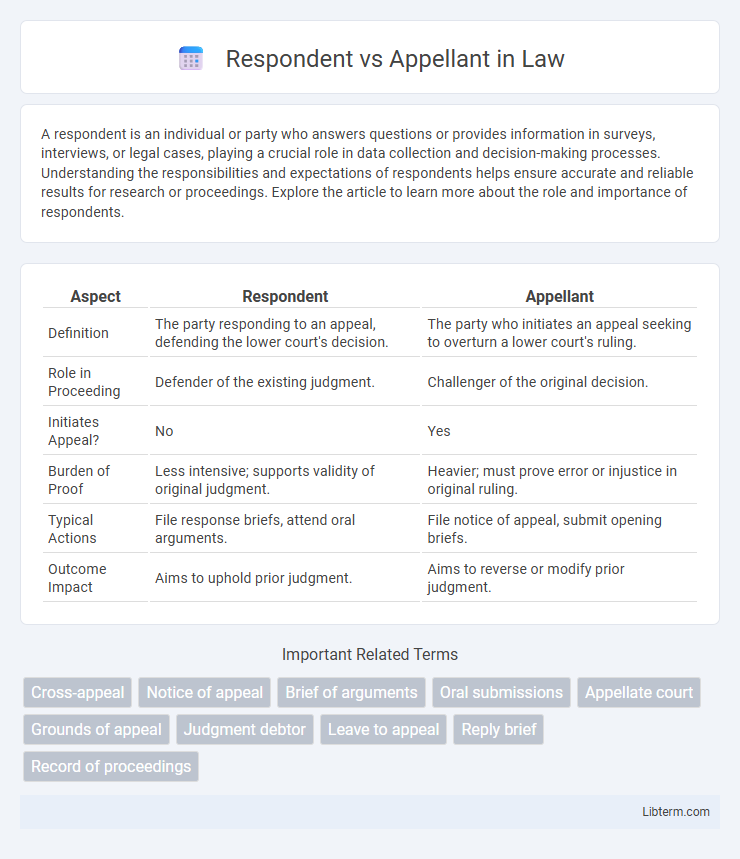A respondent is an individual or party who answers questions or provides information in surveys, interviews, or legal cases, playing a crucial role in data collection and decision-making processes. Understanding the responsibilities and expectations of respondents helps ensure accurate and reliable results for research or proceedings. Explore the article to learn more about the role and importance of respondents.
Table of Comparison
| Aspect | Respondent | Appellant |
|---|---|---|
| Definition | The party responding to an appeal, defending the lower court's decision. | The party who initiates an appeal seeking to overturn a lower court's ruling. |
| Role in Proceeding | Defender of the existing judgment. | Challenger of the original decision. |
| Initiates Appeal? | No | Yes |
| Burden of Proof | Less intensive; supports validity of original judgment. | Heavier; must prove error or injustice in original ruling. |
| Typical Actions | File response briefs, attend oral arguments. | File notice of appeal, submit opening briefs. |
| Outcome Impact | Aims to uphold prior judgment. | Aims to reverse or modify prior judgment. |
Understanding the Terms: Respondent and Appellant
The appellant is the party who initiates an appeal, seeking a review or reversal of a lower court's decision, while the respondent is the opposing party who defends the original judgment. Understanding these roles is crucial in legal proceedings, as the appellant challenges the decision and the respondent upholds it. Jurisdictional rules and procedural laws define the rights and responsibilities of both appellant and respondent during the appeals process.
Legal Definitions: Who is a Respondent?
A Respondent is the party against whom an appeal is filed in a legal proceeding, often the defendant or the party who won at the lower court level. This entity responds to the appellants' claims by defending the original judgment or decision. In appellate courts, the Respondent's role is critical as they present arguments supporting the court's prior ruling.
Legal Definitions: Who is an Appellant?
An appellant is the party who initiates an appeal by challenging a court's decision in a higher court, seeking a reversal or modification of the original judgment. This legal role contrasts with the respondent, who is the opposing party defending the lower court's ruling. Understanding the appellant's position is crucial in appellate procedure, as they bear the burden of proving errors in the initial trial or legal interpretation.
Key Differences Between Respondent and Appellant
The appellant is the party who initiates an appeal, challenging a court's decision, while the respondent is the party responding to the appeal, defending the original verdict. Key differences include the appellant's role in seeking a reversal or modification of the judgment, versus the respondent's role in upholding the trial court's decision. In legal proceedings, the appellant files the notice of appeal and briefs, whereas the respondent submits counter-arguments and answers to the appellate court.
Roles and Responsibilities in Legal Proceedings
In legal proceedings, the appellant is the party who initiates an appeal, challenging a court's decision and seeking a reversal or modification. The respondent is the party opposing the appeal, responsible for defending the original judgment and providing counterarguments. Both roles require submitting briefs, presenting evidence, and participating in oral arguments to influence the appellate court's ruling.
The Appeal Process: Step-by-Step Overview
The appeal process begins when the appellant files a notice of appeal to challenge the trial court's decision. The respondent then submits a response or brief defending the original ruling, highlighting legal and factual grounds supporting the judgment. The appellate court reviews these submissions, conducts oral arguments if necessary, and issues a ruling that may affirm, reverse, or remand the case for further proceedings.
Rights of Appellants During an Appeal
Appellants possess the right to file a timely notice of appeal and access the trial record necessary for review. They are entitled to legal representation and the opportunity to present written briefs and oral arguments before the appellate court. In many jurisdictions, appellants have the right to request a stay of the original judgment pending the appeal's outcome, safeguarding their interests throughout the appellate process.
Duties of Respondents in Appellate Cases
Respondents in appellate cases are responsible for filing a timely and comprehensive response brief that addresses the appellant's claims and supports the lower court's decision. They must provide relevant legal arguments, cite precedents, and submit necessary evidence or records to uphold the judgment. The respondent also participates in oral arguments if granted, ensuring a thorough defense of the case on appeal.
Common Scenarios Involving Appellants and Respondents
Appellants typically initiate appeals when dissatisfied with a trial court's decision, seeking a higher court's review to reverse or modify the ruling. Respondents, in contrast, defend the lower court's judgment, arguing for affirmation of the decision during appellate proceedings. Common scenarios involve civil litigation disputes, family law cases, and administrative agency appeals where appellants challenge outcomes and respondents advocate to uphold them.
Implications of Being a Respondent or Appellant
The implications of being a respondent involve defending the original decision or judgment, often requiring comprehensive evidence and legal arguments to uphold the lower court's ruling. An appellant challenges the decision, seeking reversal or modification, which demands identifying procedural errors or legal misinterpretations to convince an appellate court. The roles influence case strategy, resource allocation, and the burden of proof, significantly impacting litigation outcomes in civil, criminal, and administrative law contexts.
Respondent Infographic

 libterm.com
libterm.com